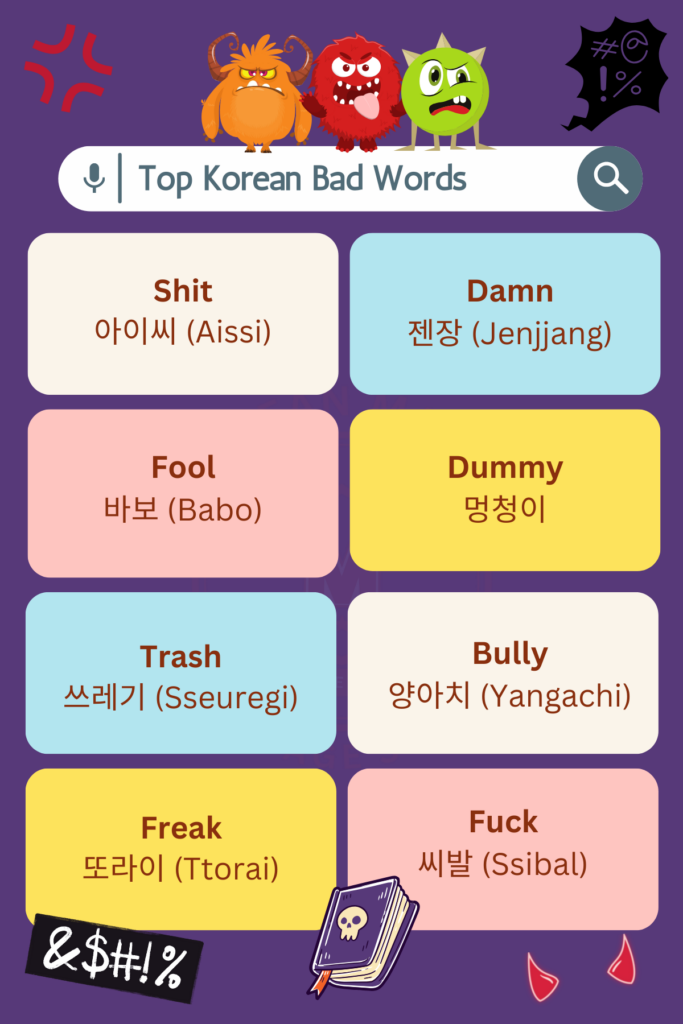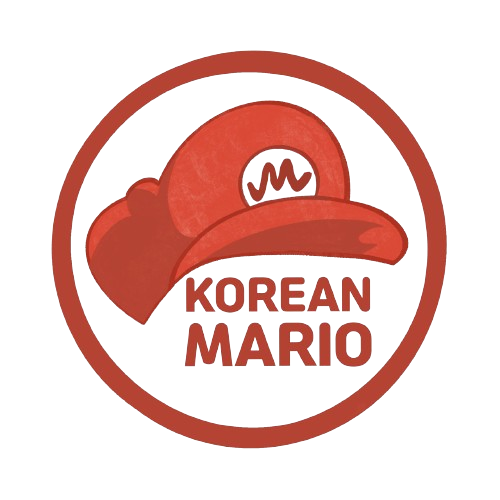
In every culture, language serves as a powerful tool for communication, expressing emotions, and conveying complex ideas. Korean, with its unique script and rich linguistic heritage, is no exception. As with any language, Korean includes words and phrases that are considered rude or inappropriate. These words, often called “bad words” or profanity, are commonly used in moments of anger, frustration, or even humor. Understanding these expressions can provide deeper insights into the Korean language and culture, highlighting the nuances of how Koreans navigate social interactions and emotions. In this blog, we will explore some of the most commonly heard and seen Korean bad words and phrases, offering a glimpse into the more colorful side of everyday Korean language.
Please take note not to use these bad words to anyone you know!
Top Korean Bad Words and Phrases
| 🔊 | Shit 아이씨 (Aissi) |
| 🔊 | Damn 젠장 (Jenjjang) |
| 🔊 | Dummy 멍청이 (Meongcheongi) |
| 🔊 | Trash 쓰레기 (Sseuregi) |
| 🔊 | Bully 양아치 (Yangachi) |
| 🔊 | Freak 또라이 (Ttorai) |
| 🔊 | Retard 병신 (Byungshin) |
| 🔊 | Nerd 찐따 (Jjintta) |
| 🔊 | Fuck 씨발 (Ssibal) |
| 🔊 | Bastard 개자식, 나쁜놈, 씨발놈, 미친놈 (Gaejasik, Nappeunnom, Ssibalnom, Michinnom) |
| 🔊 | Bitch 나쁜년, 씨발년, 미친년 (Nappeunnyeon, Ssibalnyeon, Michinnyeon) |
| 🔊 | Freaking 존나 (Jonna) |
| 🔊 | Son of a Bitch 개새끼 (Gaesaekki) |
Common Phrases
- 아이씨 (Aissi) – Shit
This is a mild curse word that expresses frustration or annoyance, similar to “shit” in English. It’s often used in exasperation and is relatively common in casual speech.
🔊 아이씨! 이번 시험 망했네
“Oh shit! I messed up this exam.”
🔊 아이씨! 게임에서 또 졌어…
“Oh shit! I lost in the game again…” - 젠장 (Jenjjang) – Damn
Equivalent to “damn,” this word is used to express irritation or disappointment. It’s a versatile term that can fit many frustrating situations.
🔊 젠장! 오늘도 야근이네…
“Damn! Another overtime today…”
🔊 젠장! 이 식당 음식 너무 맛 없잖아…
“Damn! This restaurant’s food is so bad…” - 바보 (Babo) – Fool
This word means “fool” or “idiot” and is used to describe someone who is acting stupidly. It’s often used in a teasing manner among friends.
🔊 야이 바보야, 이렇게 쉬운 문제도 틀리냐?
“You this idiot, you can’t even get such an easy question right?” - 멍청이 (Meongcheongi) – Dummy
Similar to “dummy,” this term is used to call someone out for being slow-witted or not thinking clearly. It’s less harsh than some other insults but still not very polite.
🔊 멍청아, 왜 이것도 몰라?
” Why don’t you even know this, stupid?” - 쓰레기 (Sseuregi) – Trash
Calling someone “trash” is a severe insult, implying that the person is worthless. It’s quite harsh and should be used very cautiously.
🔊 야이 쓰레기야, 어떻게 나를 두고 다른 여자를 만날 수가 있어?
“You this trash, how could you leave me and date another girl?” - 양아치 (Yangachi) – Bully
This term refers to a bully or a thug, often used to describe someone who is involved in petty crime or behaves in a menacing way.
🔊 그 친구는 어렸을 때 진짜 양아치였어
“That guy was a real bully when he was youn g when he was young.” - 또라이 (Ttorai) – Freak
Meaning “freak” or “weirdo,” this word is used to describe someone who is acting bizarrely or is perceived as strange.
🔊 내 친구 중에 완전 또라이가 있어
“I have a total freak friend.”
🔊 너 또라이냐?
“Are you a freak?” - 병신 (Byungshin) – Retard
A highly offensive term equivalent to “retard,” used to insult someone’s intelligence. It’s a word that should be avoided due to its derogatory nature.
🔊 야이 병신아, 죽고싶냐?
“You this retard, do you wanna die?”
🔊 너같은 병신이랑 친구 하기 싫어!
“I don’t wanna be friend with a retard like you!”
🔊 닥쳐 병신아!
“Shut up, idiot!” - 찐따 (Jjintta) – Nerd
This slang term is used to refer to someone who is socially awkward or nerdy. While not as harsh as some other insults, it can still be hurtful. - 씨발 (Ssibal) – Fuck
One of the most vulgar words in Korean, equivalent to “fuck” in English. It’s used in extreme anger or frustration and is very offensive.
🔊 아 씨발! 큰일났다
“Ah fuck! I’ve got a problem!”
🔊 씨발, 내 마음대로 할거야!
“Fuck, I’ll do whatever I want!”
🔊 야이 씨발! 나랑 싸워볼래?
“You this bastard! You wanna fight?” - 개자식, 나쁜놈, 씨발놈, 미친놈 (Gaejasik, Nappeunnom, Ssibalnom, Michinnom) – Bastard
These words all translate to “bastard,” with slight variations in their connotations. They are all highly offensive and used to insult someone’s character severely.
🔊 야이 나쁜놈아. 니가 인간이냐?
“You bad guy, are you even a human?”
🔊 미친놈처럼 행동하지 마!
“Don’t act like a crazy man!” - 나쁜년, 씨발년, 미친년 (Nappeunnyeon, Ssibalnyeon, Michinnyeon) – Bitch
These terms are used to insult women, equivalent to “bitch” in English. They are very offensive and should be used with caution. - 존나 (Jonna) – Freaking
A slang term used for emphasis, similar to “freaking” in English. While not as offensive as some other terms, it’s still considered impolite.
🔊 오늘 날씨 존나 덥네
“It’s freaking hot today” - 개새끼 (Gaesaekki) – Son of a Bitch
These terms translate to “son of a bitch” and are extremely vulgar, used to insult someone’s character deeply.
🔊 야이 병신새끼야! 정신 좀 차려!
“You this retarded baby! Wake up!”
🔊 또라이새끼야! 이상한 짓 좀 하지마!
“You this freak baby! Don’t do anything weird!”
Language is a living, evolving entity that reflects the culture and values of its speakers. Korean profanity, with its vivid and often harsh expressions, offers a window into the more informal and emotionally charged aspects of Korean communication. While these words and phrases are widely recognized, using them requires a nuanced understanding of context and audience. Whether you’re learning Korean for travel, study, or personal interest, being aware of these terms can help you navigate conversations more effectively and avoid unintentional offense. Remember, the key to mastering any language lies not just in the words themselves, but in understanding the culture and people who speak it.
Table of Contents

